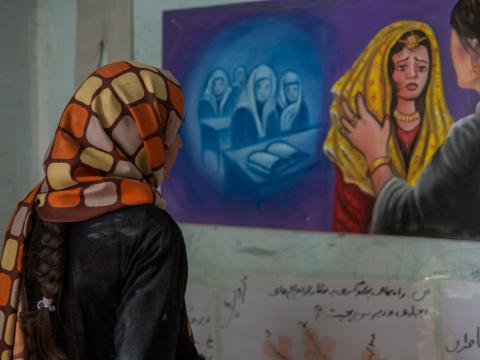Not over my dead body: An Afghan mother fights against child marriage: “Let them grow up first”

It was a surreal moment that Fatime remembers well. Her daughter had just been born - she was abut three days old - when a distant relative arrived at the doorstep, demanding that the newborn would become her five-year-old son’s wife.
“The relative brought a piece of fabric and tied it around my daughter Madine’s head, declaring that ‘this girl is for my son’,” Fatime, 35, explains.
But Fatime wasn’t having it then and is neither agreeing to it now. “Let them grow up first,” she told her relative eleven years ago, but recently, the same family made an official visit to Fatime’s house, bringing their sixteen-year-old son and demanding Madine’s hand in marriage.
Fatime admits that she might have said yes, hadn’t it been for the community classes she’d been attending.
“We’ve been discussing child marriage and the dangers of it,” she explains. “Oftentimes, it means that girls will have to leave school and, if they get pregnant, their lives can be at risk. Young girls aren’t able to take up heavy tasks in the home and this can lead to conflict, sometimes even violence.”
Traditionally, Afghan girls are viewed as dispensable property by their fathers, oftentimes with poor families marrying off their daughters at an early age to receive a Maximus bride price. About 17 percent of girls are married before they reach the age of 15, while 46 percent become wives before turning 18.
Fatime has been attending World Vision’s community change group for a while, saying that she wouldn’t miss a meeting for anything. Over time, she’s made friends with the other mothers and has found an open, supportive space to ask questions and share her daily struggles.
Her daughter Madine, now 11, has been attending school, but annulling the relative’s marriage demand hasn’t been easy.
“The family was upset. They showed up at our house with religious leaders and village elders, saying that it’s time to marry Madine off. But I refused and my husband supported me.
Growing up in an illiterate family with a mother who mainly works at home and a father who is a construction labourer, Madine is the first one in her family to go to school.
“I like Pashto classes,” she says, sitting shyly next to her mother, her head covered in a colourful headscarf. She’s thin, with olive skin and brown eyes.
“I’m glad I didn’t have to get married because my husband wouldn’t have allowed me to go to school,” she adds, explaining that the boy grew up a farmer and never attended school himself.
What happens when married off is a mystery to Madine; her mother said she didn’t explain the “duties of a wife” to her daughter, feeling ashamed. “I was married at age twelve, and I was never told what being married means,” Fatime explains. “This is the case for many girls here.”
The girl’s new marriage age has been set to 25 by her mother, and, she says, her husband has agreed.
Fatime occasionally works as a tailor and says she’s taken the opportunity to share whatever she’s learned at the community change group with her clients.
“We replicate what we learn and spread the knowledge in our community,” Fatime smiles. “I’ve gained a lot of new friends, but most importantly, I’ve won the battle for my daughter.”
On 18 August 2017, with a fund from World Vision United States, World Vision Afghanistan officially launching its “It Takes A World” campaign under the theme, “It takes all of us to end child and forced marriage.”
World Vision’s campaign seeks to tackle the root, behavioural causes of child marriage and to ensure that all children, particularly girls, are free of this scourge. This will be achieved by empowering children and youth, carrying out advocacy, and partnering with a wide spectrum of other activists to engage in community-based preventive actions.